Report on Ethics and Professionalism in Financial Advice (FPC002B)
VerifiedAdded on 2022/11/14
|11
|2350
|356
Report
AI Summary
This report delves into the critical aspects of ethics and professionalism within the financial advice sector. It begins by exploring ethical dilemmas that arise during the client-advisor fact-finding process, emphasizing the importance of protecting sensitive client information and adhering to confidentiality principles to avoid ethical breaches. The report then examines strategies to prevent ethical blindness, such as avoiding outcome-based incentives and recognizing unconscious biases. It analyzes ethical frameworks, including Aristotle's virtue ethics, deontological theory, and teleological theory, to evaluate advisor conduct in case studies. Furthermore, the report identifies barriers to ethical decision-making, such as rationalism and unconscious biases, and discusses the negative impacts of partnership dynamics and ethical blindness on client outcomes. The report concludes by differentiating professions from occupational groups, highlighting the benefits professions provide to the community, and asserting the importance of ethics in standardizing financial planning practices and protecting the public interest. The report draws on a variety of academic sources to support its claims, as evidenced by the extensive reference list.
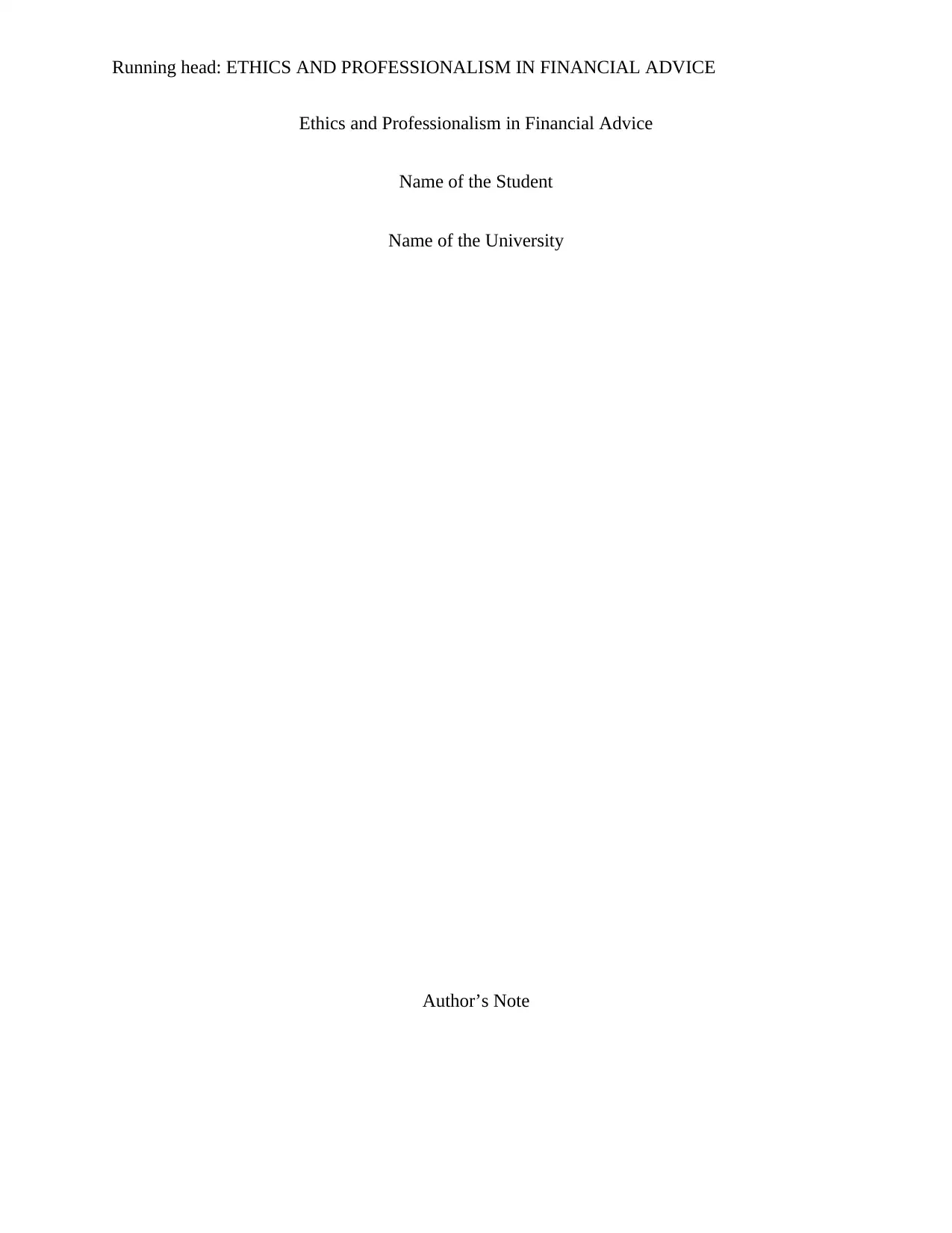
Running head: ETHICS AND PROFESSIONALISM IN FINANCIAL ADVICE
Ethics and Professionalism in Financial Advice
Name of the Student
Name of the University
Author’s Note
Ethics and Professionalism in Financial Advice
Name of the Student
Name of the University
Author’s Note
Paraphrase This Document
Need a fresh take? Get an instant paraphrase of this document with our AI Paraphraser
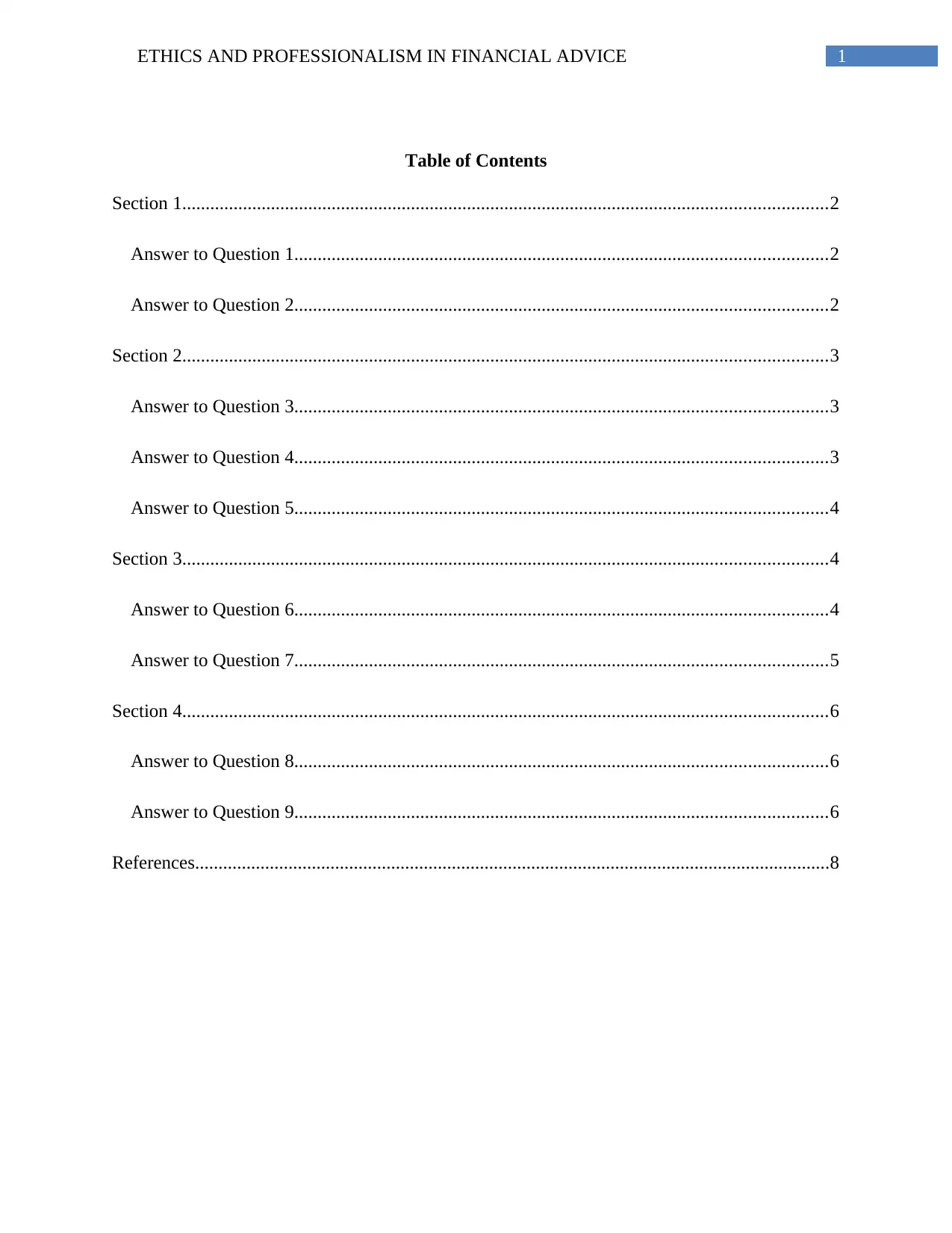
1ETHICS AND PROFESSIONALISM IN FINANCIAL ADVICE
Table of Contents
Section 1..........................................................................................................................................2
Answer to Question 1..................................................................................................................2
Answer to Question 2..................................................................................................................2
Section 2..........................................................................................................................................3
Answer to Question 3..................................................................................................................3
Answer to Question 4..................................................................................................................3
Answer to Question 5..................................................................................................................4
Section 3..........................................................................................................................................4
Answer to Question 6..................................................................................................................4
Answer to Question 7..................................................................................................................5
Section 4..........................................................................................................................................6
Answer to Question 8..................................................................................................................6
Answer to Question 9..................................................................................................................6
References........................................................................................................................................8
Table of Contents
Section 1..........................................................................................................................................2
Answer to Question 1..................................................................................................................2
Answer to Question 2..................................................................................................................2
Section 2..........................................................................................................................................3
Answer to Question 3..................................................................................................................3
Answer to Question 4..................................................................................................................3
Answer to Question 5..................................................................................................................4
Section 3..........................................................................................................................................4
Answer to Question 6..................................................................................................................4
Answer to Question 7..................................................................................................................5
Section 4..........................................................................................................................................6
Answer to Question 8..................................................................................................................6
Answer to Question 9..................................................................................................................6
References........................................................................................................................................8
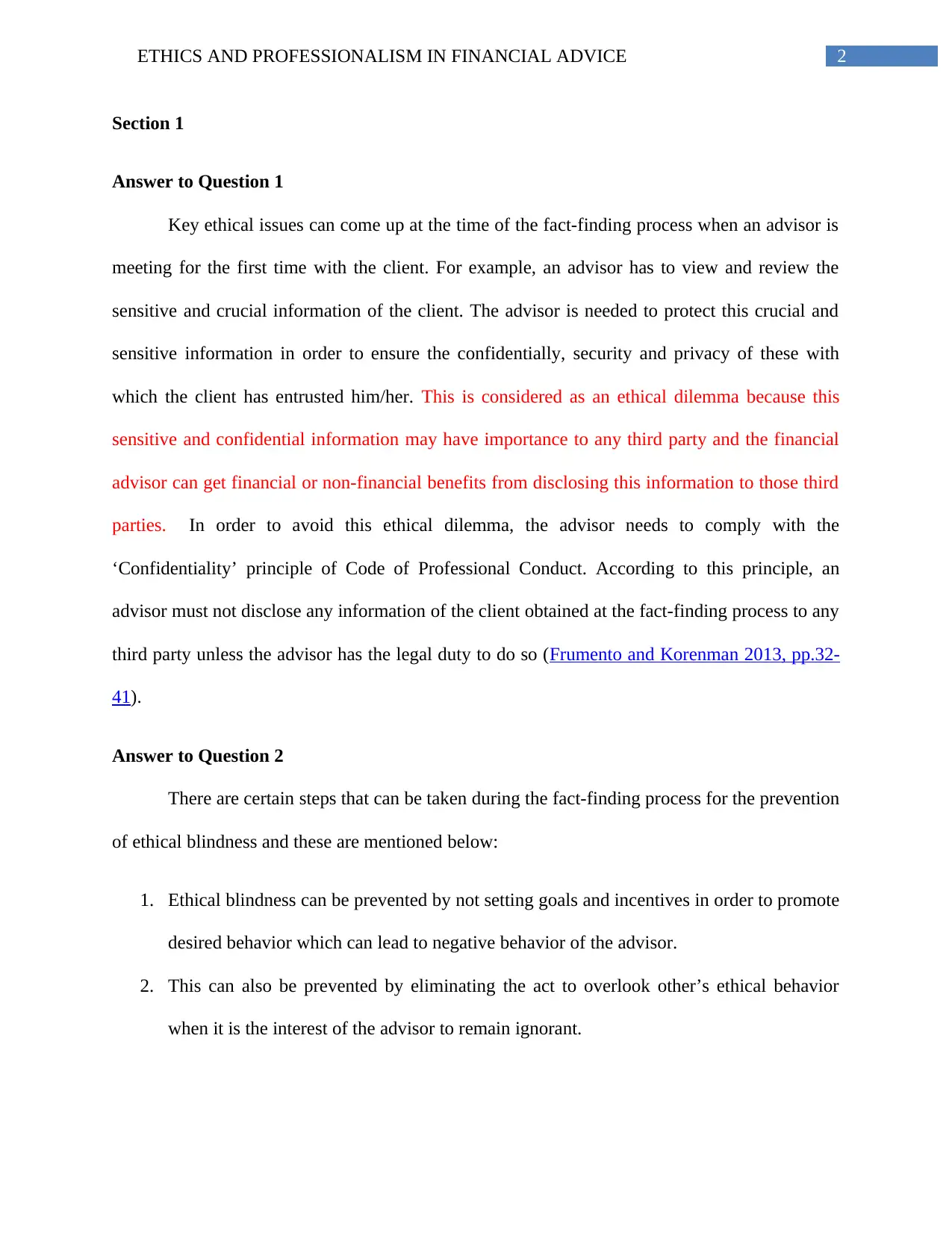
2ETHICS AND PROFESSIONALISM IN FINANCIAL ADVICE
Section 1
Answer to Question 1
Key ethical issues can come up at the time of the fact-finding process when an advisor is
meeting for the first time with the client. For example, an advisor has to view and review the
sensitive and crucial information of the client. The advisor is needed to protect this crucial and
sensitive information in order to ensure the confidentially, security and privacy of these with
which the client has entrusted him/her. This is considered as an ethical dilemma because this
sensitive and confidential information may have importance to any third party and the financial
advisor can get financial or non-financial benefits from disclosing this information to those third
parties. In order to avoid this ethical dilemma, the advisor needs to comply with the
‘Confidentiality’ principle of Code of Professional Conduct. According to this principle, an
advisor must not disclose any information of the client obtained at the fact-finding process to any
third party unless the advisor has the legal duty to do so (Frumento and Korenman 2013, pp.32-
41).
Answer to Question 2
There are certain steps that can be taken during the fact-finding process for the prevention
of ethical blindness and these are mentioned below:
1. Ethical blindness can be prevented by not setting goals and incentives in order to promote
desired behavior which can lead to negative behavior of the advisor.
2. This can also be prevented by eliminating the act to overlook other’s ethical behavior
when it is the interest of the advisor to remain ignorant.
Section 1
Answer to Question 1
Key ethical issues can come up at the time of the fact-finding process when an advisor is
meeting for the first time with the client. For example, an advisor has to view and review the
sensitive and crucial information of the client. The advisor is needed to protect this crucial and
sensitive information in order to ensure the confidentially, security and privacy of these with
which the client has entrusted him/her. This is considered as an ethical dilemma because this
sensitive and confidential information may have importance to any third party and the financial
advisor can get financial or non-financial benefits from disclosing this information to those third
parties. In order to avoid this ethical dilemma, the advisor needs to comply with the
‘Confidentiality’ principle of Code of Professional Conduct. According to this principle, an
advisor must not disclose any information of the client obtained at the fact-finding process to any
third party unless the advisor has the legal duty to do so (Frumento and Korenman 2013, pp.32-
41).
Answer to Question 2
There are certain steps that can be taken during the fact-finding process for the prevention
of ethical blindness and these are mentioned below:
1. Ethical blindness can be prevented by not setting goals and incentives in order to promote
desired behavior which can lead to negative behavior of the advisor.
2. This can also be prevented by eliminating the act to overlook other’s ethical behavior
when it is the interest of the advisor to remain ignorant.
⊘ This is a preview!⊘
Do you want full access?
Subscribe today to unlock all pages.

Trusted by 1+ million students worldwide
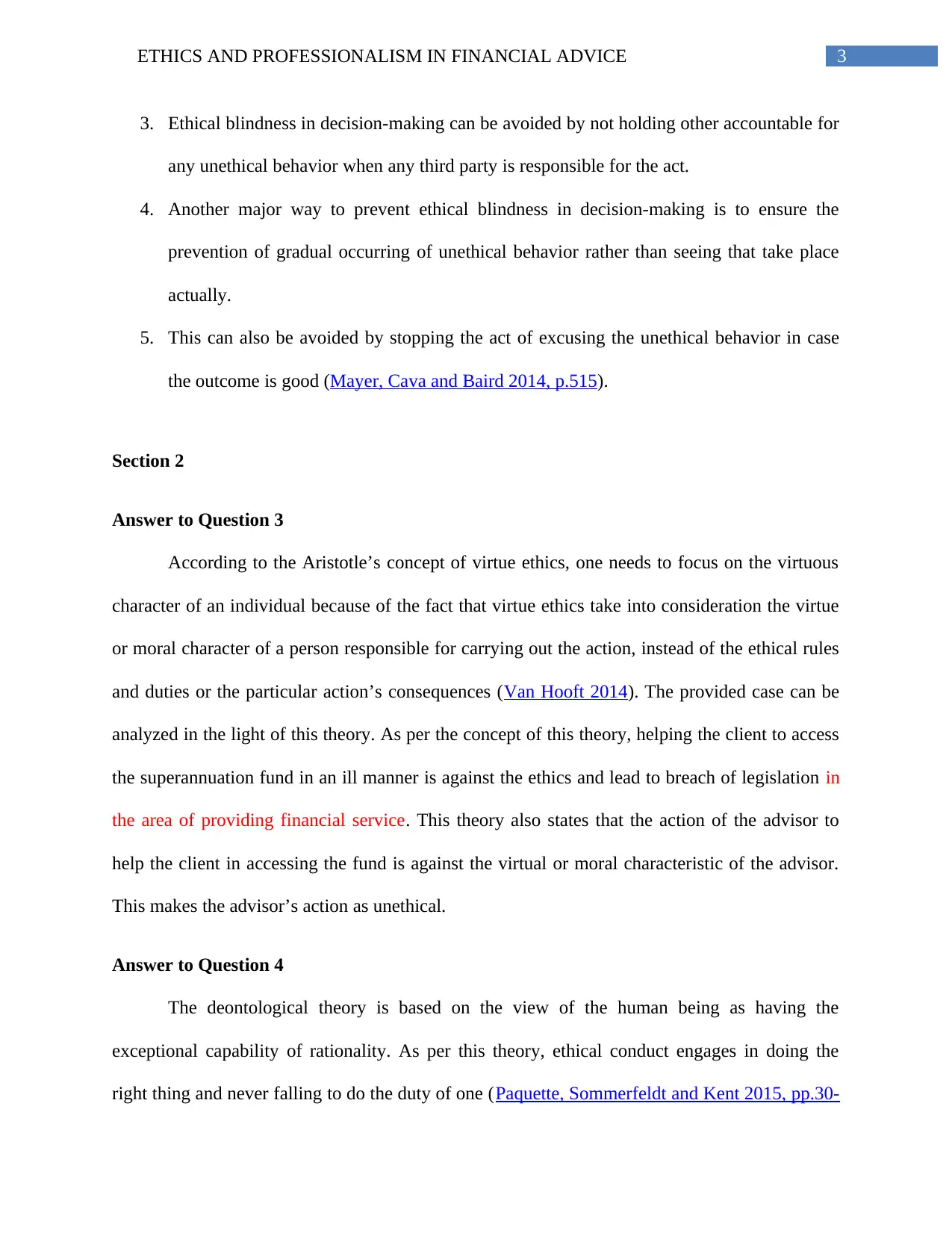
3ETHICS AND PROFESSIONALISM IN FINANCIAL ADVICE
3. Ethical blindness in decision-making can be avoided by not holding other accountable for
any unethical behavior when any third party is responsible for the act.
4. Another major way to prevent ethical blindness in decision-making is to ensure the
prevention of gradual occurring of unethical behavior rather than seeing that take place
actually.
5. This can also be avoided by stopping the act of excusing the unethical behavior in case
the outcome is good (Mayer, Cava and Baird 2014, p.515).
Section 2
Answer to Question 3
According to the Aristotle’s concept of virtue ethics, one needs to focus on the virtuous
character of an individual because of the fact that virtue ethics take into consideration the virtue
or moral character of a person responsible for carrying out the action, instead of the ethical rules
and duties or the particular action’s consequences (Van Hooft 2014). The provided case can be
analyzed in the light of this theory. As per the concept of this theory, helping the client to access
the superannuation fund in an ill manner is against the ethics and lead to breach of legislation in
the area of providing financial service. This theory also states that the action of the advisor to
help the client in accessing the fund is against the virtual or moral characteristic of the advisor.
This makes the advisor’s action as unethical.
Answer to Question 4
The deontological theory is based on the view of the human being as having the
exceptional capability of rationality. As per this theory, ethical conduct engages in doing the
right thing and never falling to do the duty of one (Paquette, Sommerfeldt and Kent 2015, pp.30-
3. Ethical blindness in decision-making can be avoided by not holding other accountable for
any unethical behavior when any third party is responsible for the act.
4. Another major way to prevent ethical blindness in decision-making is to ensure the
prevention of gradual occurring of unethical behavior rather than seeing that take place
actually.
5. This can also be avoided by stopping the act of excusing the unethical behavior in case
the outcome is good (Mayer, Cava and Baird 2014, p.515).
Section 2
Answer to Question 3
According to the Aristotle’s concept of virtue ethics, one needs to focus on the virtuous
character of an individual because of the fact that virtue ethics take into consideration the virtue
or moral character of a person responsible for carrying out the action, instead of the ethical rules
and duties or the particular action’s consequences (Van Hooft 2014). The provided case can be
analyzed in the light of this theory. As per the concept of this theory, helping the client to access
the superannuation fund in an ill manner is against the ethics and lead to breach of legislation in
the area of providing financial service. This theory also states that the action of the advisor to
help the client in accessing the fund is against the virtual or moral characteristic of the advisor.
This makes the advisor’s action as unethical.
Answer to Question 4
The deontological theory is based on the view of the human being as having the
exceptional capability of rationality. As per this theory, ethical conduct engages in doing the
right thing and never falling to do the duty of one (Paquette, Sommerfeldt and Kent 2015, pp.30-
Paraphrase This Document
Need a fresh take? Get an instant paraphrase of this document with our AI Paraphraser
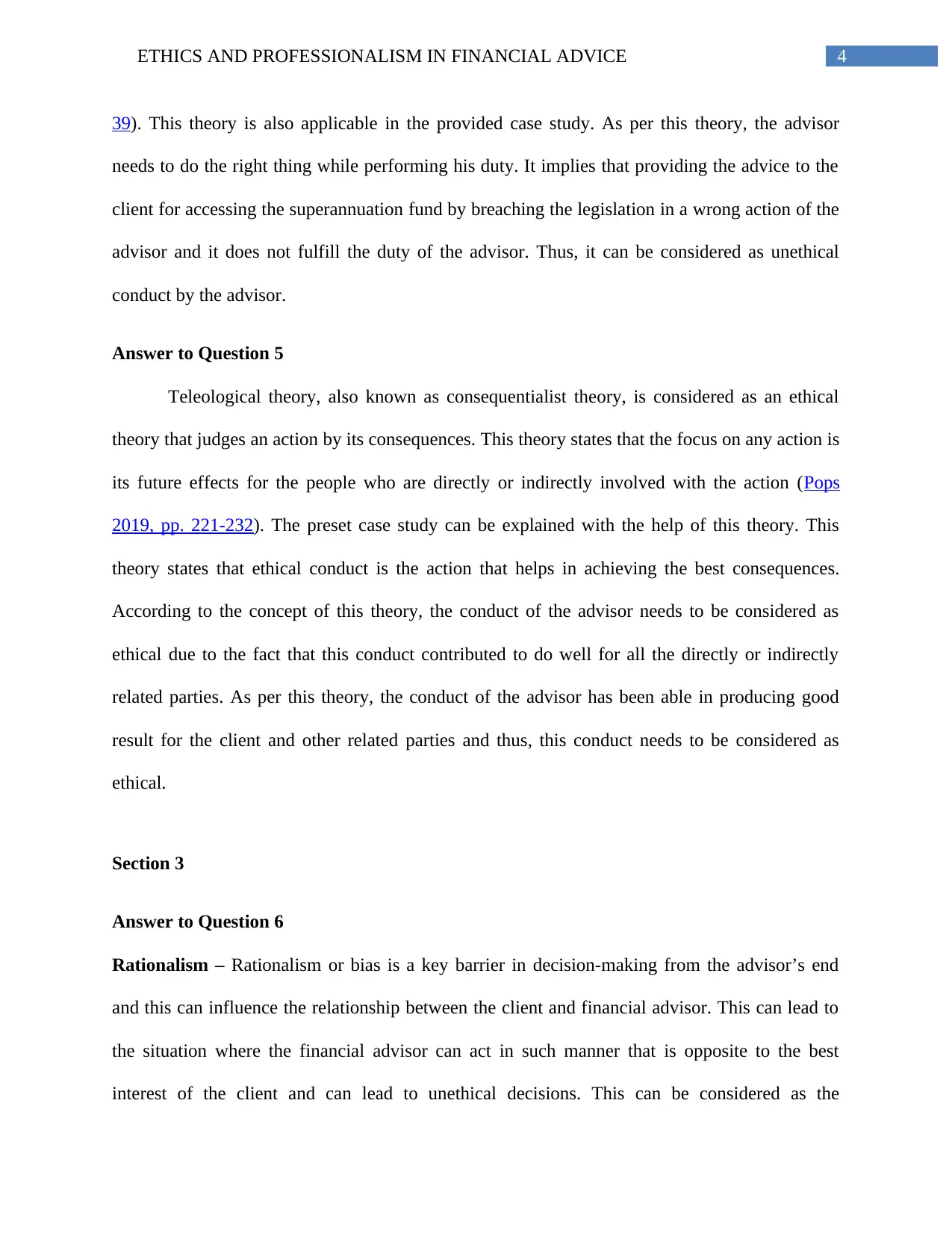
4ETHICS AND PROFESSIONALISM IN FINANCIAL ADVICE
39). This theory is also applicable in the provided case study. As per this theory, the advisor
needs to do the right thing while performing his duty. It implies that providing the advice to the
client for accessing the superannuation fund by breaching the legislation in a wrong action of the
advisor and it does not fulfill the duty of the advisor. Thus, it can be considered as unethical
conduct by the advisor.
Answer to Question 5
Teleological theory, also known as consequentialist theory, is considered as an ethical
theory that judges an action by its consequences. This theory states that the focus on any action is
its future effects for the people who are directly or indirectly involved with the action (Pops
2019, pp. 221-232). The preset case study can be explained with the help of this theory. This
theory states that ethical conduct is the action that helps in achieving the best consequences.
According to the concept of this theory, the conduct of the advisor needs to be considered as
ethical due to the fact that this conduct contributed to do well for all the directly or indirectly
related parties. As per this theory, the conduct of the advisor has been able in producing good
result for the client and other related parties and thus, this conduct needs to be considered as
ethical.
Section 3
Answer to Question 6
Rationalism – Rationalism or bias is a key barrier in decision-making from the advisor’s end
and this can influence the relationship between the client and financial advisor. This can lead to
the situation where the financial advisor can act in such manner that is opposite to the best
interest of the client and can lead to unethical decisions. This can be considered as the
39). This theory is also applicable in the provided case study. As per this theory, the advisor
needs to do the right thing while performing his duty. It implies that providing the advice to the
client for accessing the superannuation fund by breaching the legislation in a wrong action of the
advisor and it does not fulfill the duty of the advisor. Thus, it can be considered as unethical
conduct by the advisor.
Answer to Question 5
Teleological theory, also known as consequentialist theory, is considered as an ethical
theory that judges an action by its consequences. This theory states that the focus on any action is
its future effects for the people who are directly or indirectly involved with the action (Pops
2019, pp. 221-232). The preset case study can be explained with the help of this theory. This
theory states that ethical conduct is the action that helps in achieving the best consequences.
According to the concept of this theory, the conduct of the advisor needs to be considered as
ethical due to the fact that this conduct contributed to do well for all the directly or indirectly
related parties. As per this theory, the conduct of the advisor has been able in producing good
result for the client and other related parties and thus, this conduct needs to be considered as
ethical.
Section 3
Answer to Question 6
Rationalism – Rationalism or bias is a key barrier in decision-making from the advisor’s end
and this can influence the relationship between the client and financial advisor. This can lead to
the situation where the financial advisor can act in such manner that is opposite to the best
interest of the client and can lead to unethical decisions. This can be considered as the
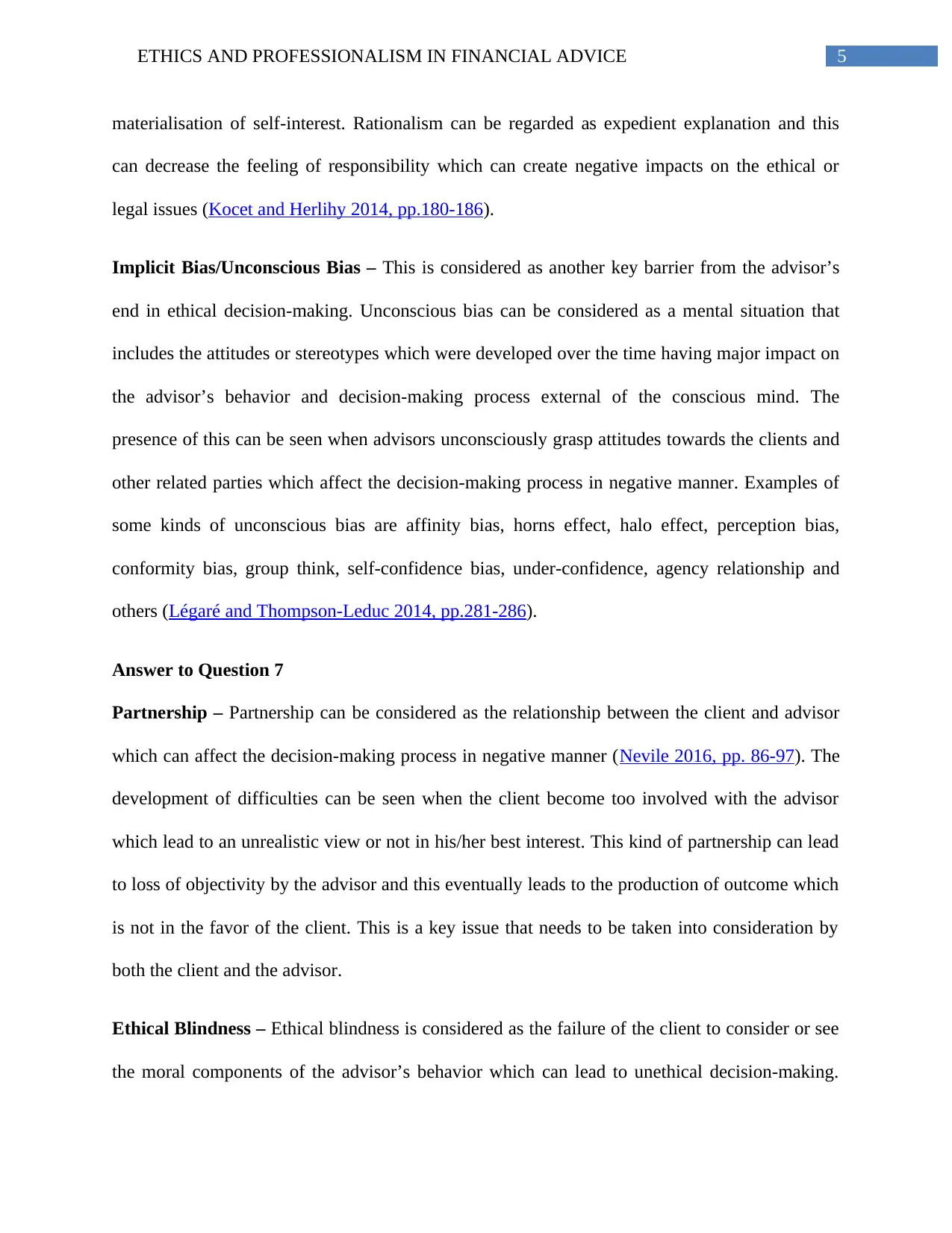
5ETHICS AND PROFESSIONALISM IN FINANCIAL ADVICE
materialisation of self-interest. Rationalism can be regarded as expedient explanation and this
can decrease the feeling of responsibility which can create negative impacts on the ethical or
legal issues (Kocet and Herlihy 2014, pp.180-186).
Implicit Bias/Unconscious Bias – This is considered as another key barrier from the advisor’s
end in ethical decision-making. Unconscious bias can be considered as a mental situation that
includes the attitudes or stereotypes which were developed over the time having major impact on
the advisor’s behavior and decision-making process external of the conscious mind. The
presence of this can be seen when advisors unconsciously grasp attitudes towards the clients and
other related parties which affect the decision-making process in negative manner. Examples of
some kinds of unconscious bias are affinity bias, horns effect, halo effect, perception bias,
conformity bias, group think, self-confidence bias, under-confidence, agency relationship and
others (Légaré and Thompson-Leduc 2014, pp.281-286).
Answer to Question 7
Partnership – Partnership can be considered as the relationship between the client and advisor
which can affect the decision-making process in negative manner (Nevile 2016, pp. 86-97). The
development of difficulties can be seen when the client become too involved with the advisor
which lead to an unrealistic view or not in his/her best interest. This kind of partnership can lead
to loss of objectivity by the advisor and this eventually leads to the production of outcome which
is not in the favor of the client. This is a key issue that needs to be taken into consideration by
both the client and the advisor.
Ethical Blindness – Ethical blindness is considered as the failure of the client to consider or see
the moral components of the advisor’s behavior which can lead to unethical decision-making.
materialisation of self-interest. Rationalism can be regarded as expedient explanation and this
can decrease the feeling of responsibility which can create negative impacts on the ethical or
legal issues (Kocet and Herlihy 2014, pp.180-186).
Implicit Bias/Unconscious Bias – This is considered as another key barrier from the advisor’s
end in ethical decision-making. Unconscious bias can be considered as a mental situation that
includes the attitudes or stereotypes which were developed over the time having major impact on
the advisor’s behavior and decision-making process external of the conscious mind. The
presence of this can be seen when advisors unconsciously grasp attitudes towards the clients and
other related parties which affect the decision-making process in negative manner. Examples of
some kinds of unconscious bias are affinity bias, horns effect, halo effect, perception bias,
conformity bias, group think, self-confidence bias, under-confidence, agency relationship and
others (Légaré and Thompson-Leduc 2014, pp.281-286).
Answer to Question 7
Partnership – Partnership can be considered as the relationship between the client and advisor
which can affect the decision-making process in negative manner (Nevile 2016, pp. 86-97). The
development of difficulties can be seen when the client become too involved with the advisor
which lead to an unrealistic view or not in his/her best interest. This kind of partnership can lead
to loss of objectivity by the advisor and this eventually leads to the production of outcome which
is not in the favor of the client. This is a key issue that needs to be taken into consideration by
both the client and the advisor.
Ethical Blindness – Ethical blindness is considered as the failure of the client to consider or see
the moral components of the advisor’s behavior which can lead to unethical decision-making.
⊘ This is a preview!⊘
Do you want full access?
Subscribe today to unlock all pages.

Trusted by 1+ million students worldwide
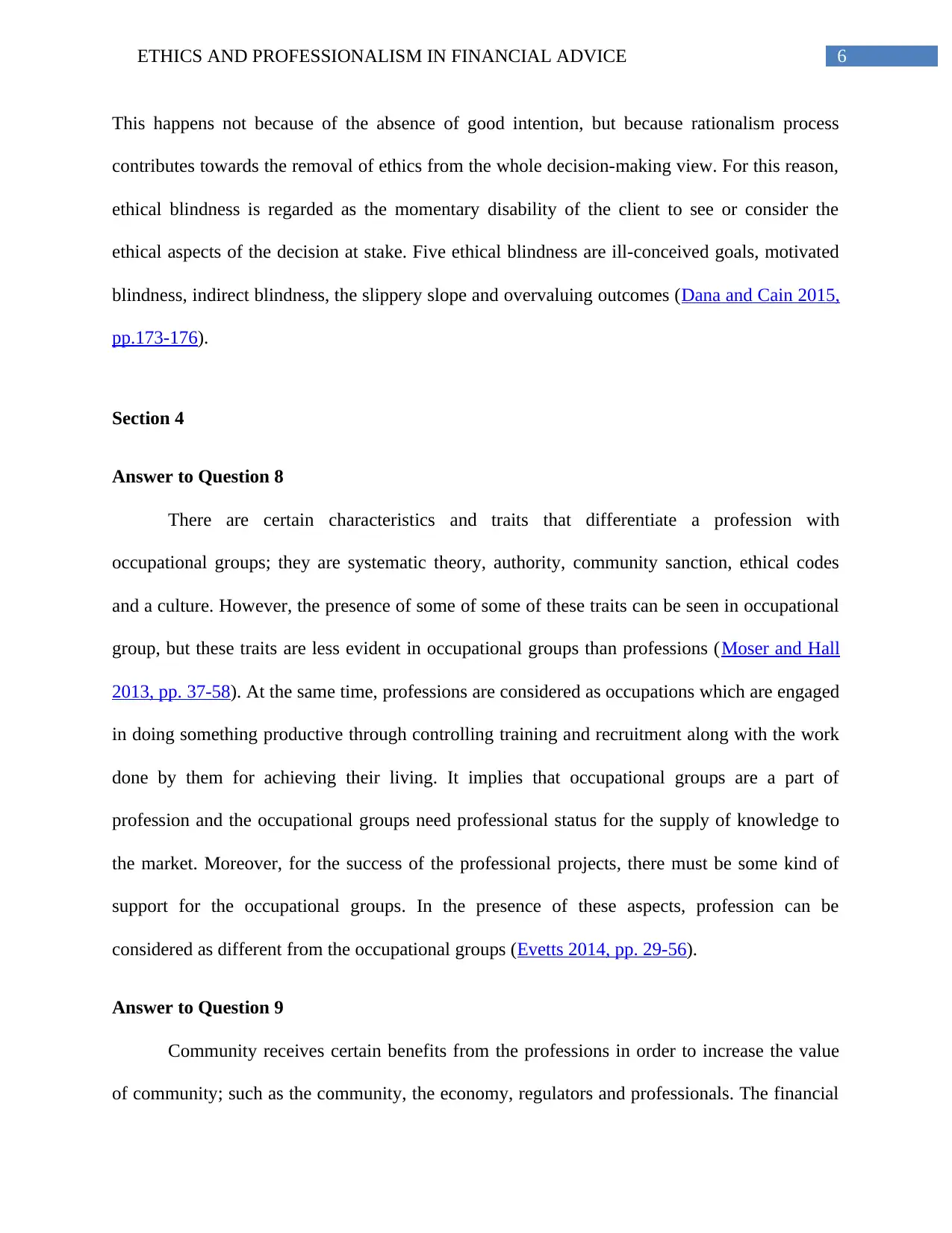
6ETHICS AND PROFESSIONALISM IN FINANCIAL ADVICE
This happens not because of the absence of good intention, but because rationalism process
contributes towards the removal of ethics from the whole decision-making view. For this reason,
ethical blindness is regarded as the momentary disability of the client to see or consider the
ethical aspects of the decision at stake. Five ethical blindness are ill-conceived goals, motivated
blindness, indirect blindness, the slippery slope and overvaluing outcomes (Dana and Cain 2015,
pp.173-176).
Section 4
Answer to Question 8
There are certain characteristics and traits that differentiate a profession with
occupational groups; they are systematic theory, authority, community sanction, ethical codes
and a culture. However, the presence of some of some of these traits can be seen in occupational
group, but these traits are less evident in occupational groups than professions (Moser and Hall
2013, pp. 37-58). At the same time, professions are considered as occupations which are engaged
in doing something productive through controlling training and recruitment along with the work
done by them for achieving their living. It implies that occupational groups are a part of
profession and the occupational groups need professional status for the supply of knowledge to
the market. Moreover, for the success of the professional projects, there must be some kind of
support for the occupational groups. In the presence of these aspects, profession can be
considered as different from the occupational groups (Evetts 2014, pp. 29-56).
Answer to Question 9
Community receives certain benefits from the professions in order to increase the value
of community; such as the community, the economy, regulators and professionals. The financial
This happens not because of the absence of good intention, but because rationalism process
contributes towards the removal of ethics from the whole decision-making view. For this reason,
ethical blindness is regarded as the momentary disability of the client to see or consider the
ethical aspects of the decision at stake. Five ethical blindness are ill-conceived goals, motivated
blindness, indirect blindness, the slippery slope and overvaluing outcomes (Dana and Cain 2015,
pp.173-176).
Section 4
Answer to Question 8
There are certain characteristics and traits that differentiate a profession with
occupational groups; they are systematic theory, authority, community sanction, ethical codes
and a culture. However, the presence of some of some of these traits can be seen in occupational
group, but these traits are less evident in occupational groups than professions (Moser and Hall
2013, pp. 37-58). At the same time, professions are considered as occupations which are engaged
in doing something productive through controlling training and recruitment along with the work
done by them for achieving their living. It implies that occupational groups are a part of
profession and the occupational groups need professional status for the supply of knowledge to
the market. Moreover, for the success of the professional projects, there must be some kind of
support for the occupational groups. In the presence of these aspects, profession can be
considered as different from the occupational groups (Evetts 2014, pp. 29-56).
Answer to Question 9
Community receives certain benefits from the professions in order to increase the value
of community; such as the community, the economy, regulators and professionals. The financial
Paraphrase This Document
Need a fresh take? Get an instant paraphrase of this document with our AI Paraphraser
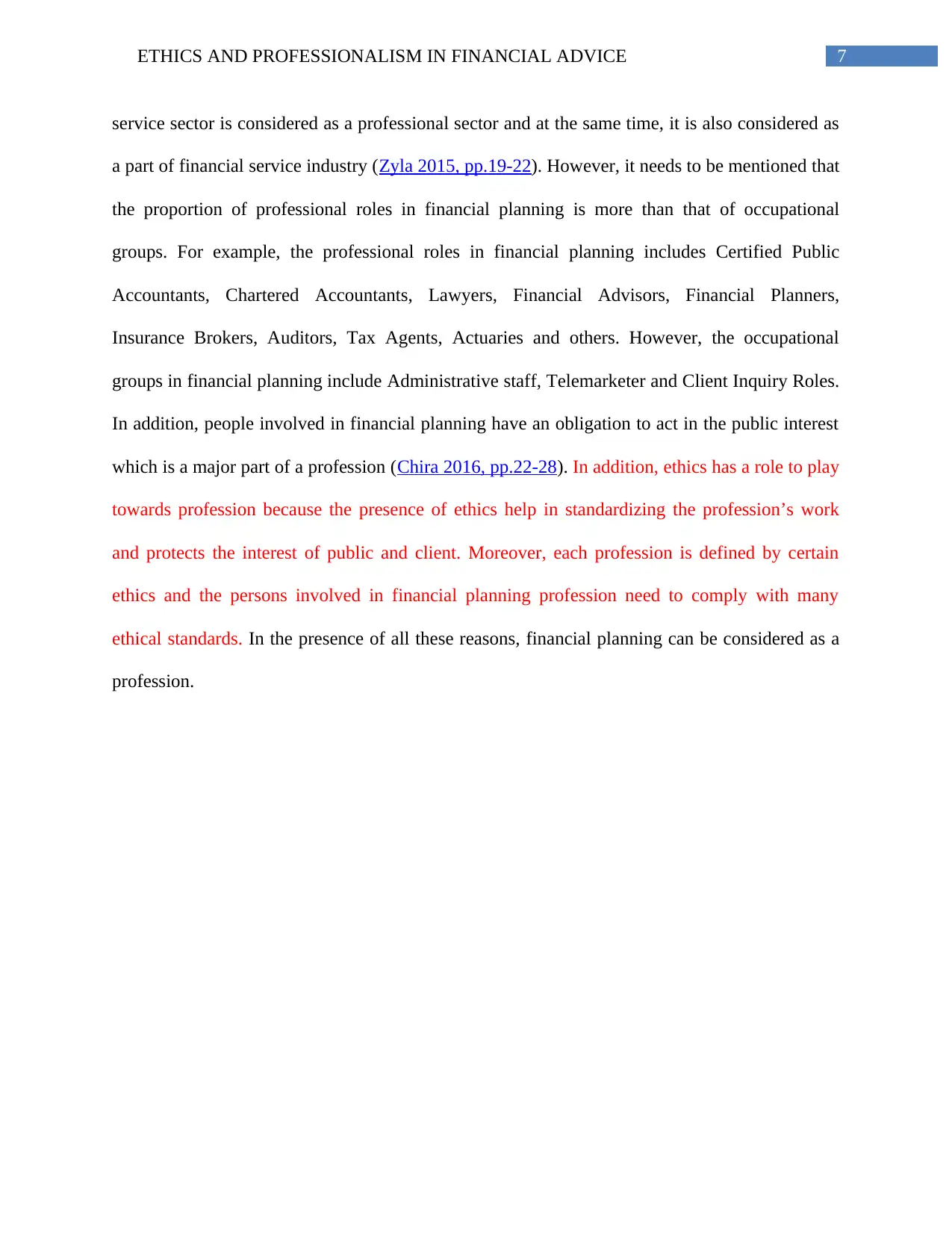
7ETHICS AND PROFESSIONALISM IN FINANCIAL ADVICE
service sector is considered as a professional sector and at the same time, it is also considered as
a part of financial service industry (Zyla 2015, pp.19-22). However, it needs to be mentioned that
the proportion of professional roles in financial planning is more than that of occupational
groups. For example, the professional roles in financial planning includes Certified Public
Accountants, Chartered Accountants, Lawyers, Financial Advisors, Financial Planners,
Insurance Brokers, Auditors, Tax Agents, Actuaries and others. However, the occupational
groups in financial planning include Administrative staff, Telemarketer and Client Inquiry Roles.
In addition, people involved in financial planning have an obligation to act in the public interest
which is a major part of a profession (Chira 2016, pp.22-28). In addition, ethics has a role to play
towards profession because the presence of ethics help in standardizing the profession’s work
and protects the interest of public and client. Moreover, each profession is defined by certain
ethics and the persons involved in financial planning profession need to comply with many
ethical standards. In the presence of all these reasons, financial planning can be considered as a
profession.
service sector is considered as a professional sector and at the same time, it is also considered as
a part of financial service industry (Zyla 2015, pp.19-22). However, it needs to be mentioned that
the proportion of professional roles in financial planning is more than that of occupational
groups. For example, the professional roles in financial planning includes Certified Public
Accountants, Chartered Accountants, Lawyers, Financial Advisors, Financial Planners,
Insurance Brokers, Auditors, Tax Agents, Actuaries and others. However, the occupational
groups in financial planning include Administrative staff, Telemarketer and Client Inquiry Roles.
In addition, people involved in financial planning have an obligation to act in the public interest
which is a major part of a profession (Chira 2016, pp.22-28). In addition, ethics has a role to play
towards profession because the presence of ethics help in standardizing the profession’s work
and protects the interest of public and client. Moreover, each profession is defined by certain
ethics and the persons involved in financial planning profession need to comply with many
ethical standards. In the presence of all these reasons, financial planning can be considered as a
profession.
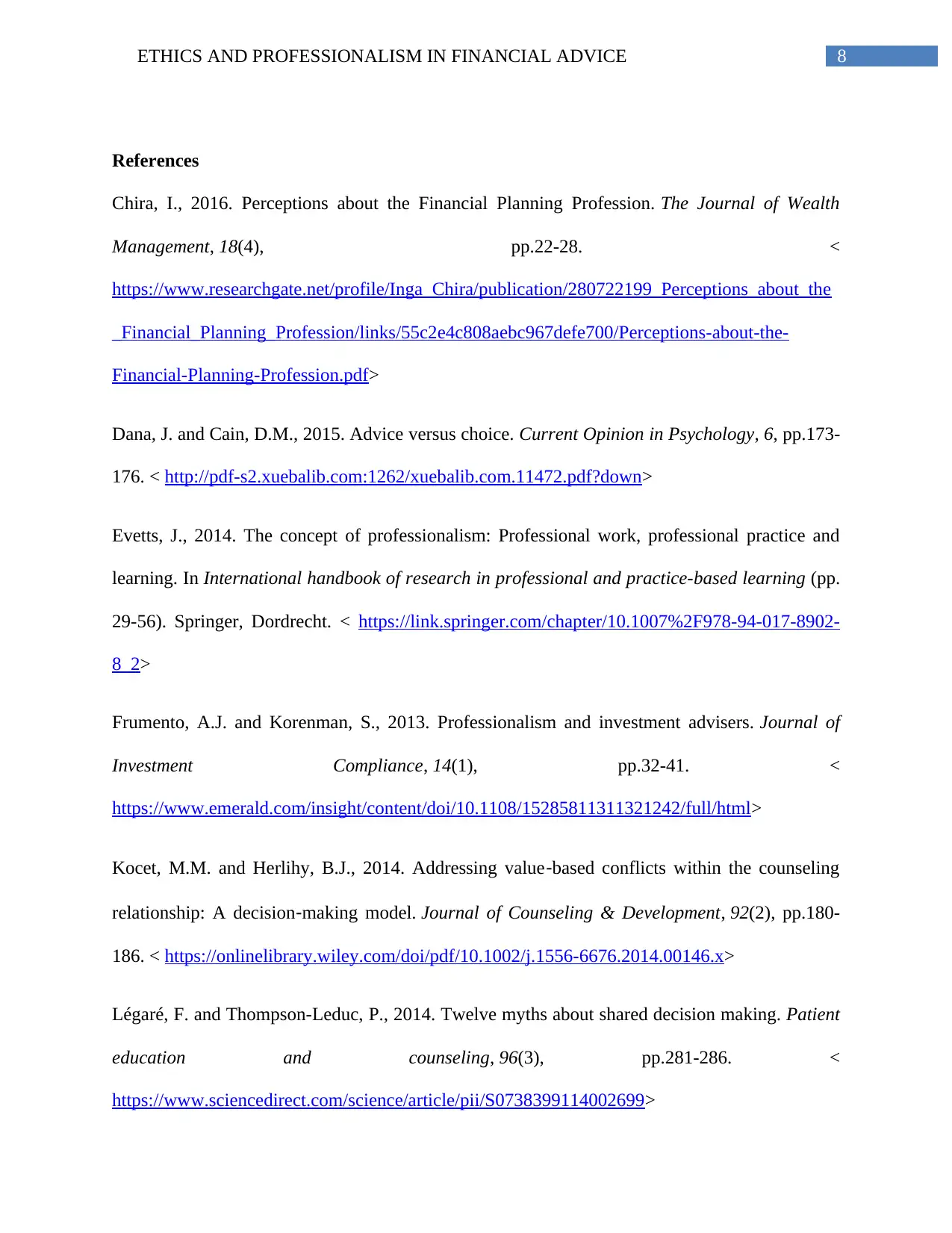
8ETHICS AND PROFESSIONALISM IN FINANCIAL ADVICE
References
Chira, I., 2016. Perceptions about the Financial Planning Profession. The Journal of Wealth
Management, 18(4), pp.22-28. <
https://www.researchgate.net/profile/Inga_Chira/publication/280722199_Perceptions_about_the
_Financial_Planning_Profession/links/55c2e4c808aebc967defe700/Perceptions-about-the-
Financial-Planning-Profession.pdf>
Dana, J. and Cain, D.M., 2015. Advice versus choice. Current Opinion in Psychology, 6, pp.173-
176. < http://pdf-s2.xuebalib.com:1262/xuebalib.com.11472.pdf?down>
Evetts, J., 2014. The concept of professionalism: Professional work, professional practice and
learning. In International handbook of research in professional and practice-based learning (pp.
29-56). Springer, Dordrecht. < https://link.springer.com/chapter/10.1007%2F978-94-017-8902-
8_2>
Frumento, A.J. and Korenman, S., 2013. Professionalism and investment advisers. Journal of
Investment Compliance, 14(1), pp.32-41. <
https://www.emerald.com/insight/content/doi/10.1108/15285811311321242/full/html>
Kocet, M.M. and Herlihy, B.J., 2014. Addressing value‐based conflicts within the counseling
relationship: A decision‐making model. Journal of Counseling & Development, 92(2), pp.180-
186. < https://onlinelibrary.wiley.com/doi/pdf/10.1002/j.1556-6676.2014.00146.x>
Légaré, F. and Thompson-Leduc, P., 2014. Twelve myths about shared decision making. Patient
education and counseling, 96(3), pp.281-286. <
https://www.sciencedirect.com/science/article/pii/S0738399114002699>
References
Chira, I., 2016. Perceptions about the Financial Planning Profession. The Journal of Wealth
Management, 18(4), pp.22-28. <
https://www.researchgate.net/profile/Inga_Chira/publication/280722199_Perceptions_about_the
_Financial_Planning_Profession/links/55c2e4c808aebc967defe700/Perceptions-about-the-
Financial-Planning-Profession.pdf>
Dana, J. and Cain, D.M., 2015. Advice versus choice. Current Opinion in Psychology, 6, pp.173-
176. < http://pdf-s2.xuebalib.com:1262/xuebalib.com.11472.pdf?down>
Evetts, J., 2014. The concept of professionalism: Professional work, professional practice and
learning. In International handbook of research in professional and practice-based learning (pp.
29-56). Springer, Dordrecht. < https://link.springer.com/chapter/10.1007%2F978-94-017-8902-
8_2>
Frumento, A.J. and Korenman, S., 2013. Professionalism and investment advisers. Journal of
Investment Compliance, 14(1), pp.32-41. <
https://www.emerald.com/insight/content/doi/10.1108/15285811311321242/full/html>
Kocet, M.M. and Herlihy, B.J., 2014. Addressing value‐based conflicts within the counseling
relationship: A decision‐making model. Journal of Counseling & Development, 92(2), pp.180-
186. < https://onlinelibrary.wiley.com/doi/pdf/10.1002/j.1556-6676.2014.00146.x>
Légaré, F. and Thompson-Leduc, P., 2014. Twelve myths about shared decision making. Patient
education and counseling, 96(3), pp.281-286. <
https://www.sciencedirect.com/science/article/pii/S0738399114002699>
⊘ This is a preview!⊘
Do you want full access?
Subscribe today to unlock all pages.

Trusted by 1+ million students worldwide
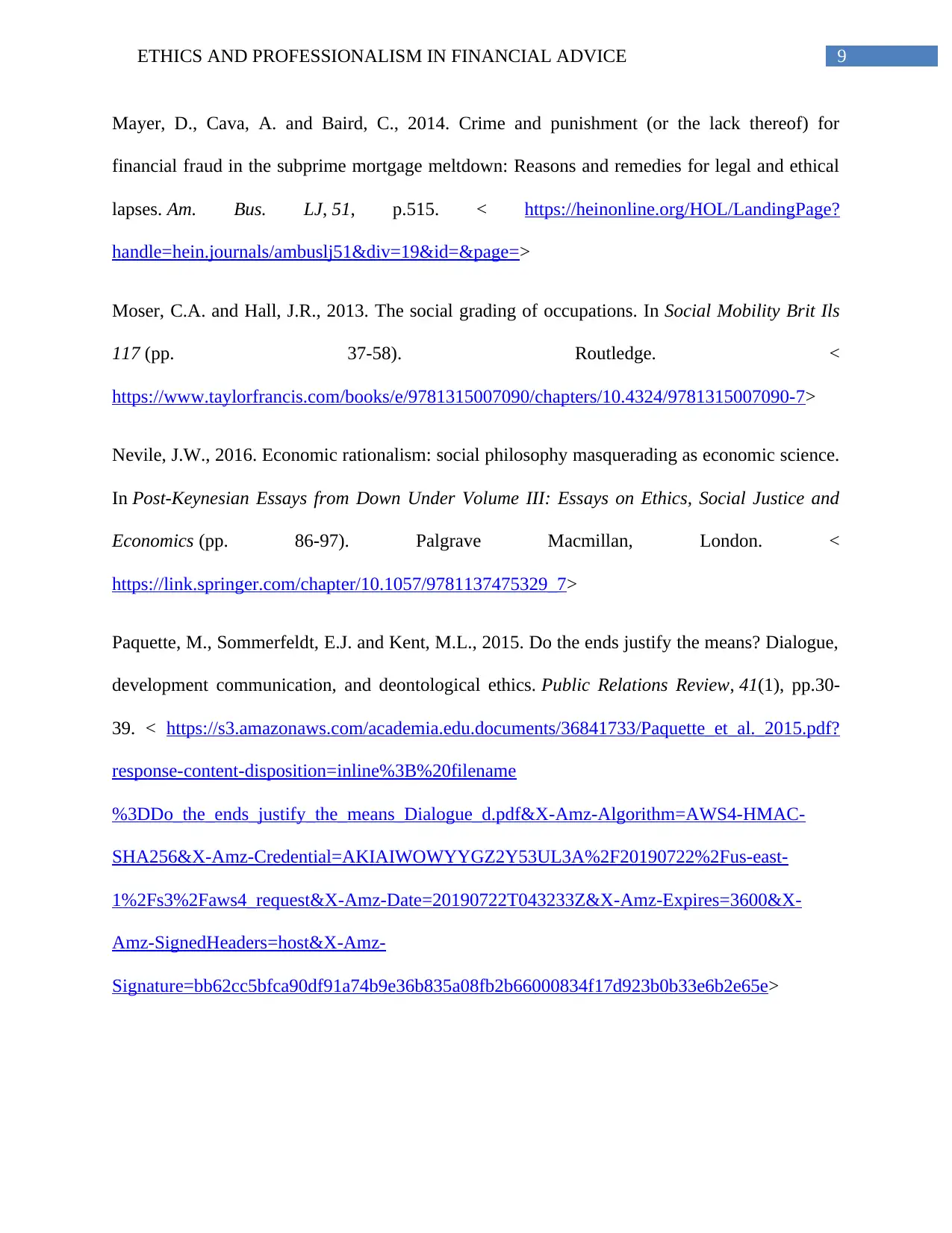
9ETHICS AND PROFESSIONALISM IN FINANCIAL ADVICE
Mayer, D., Cava, A. and Baird, C., 2014. Crime and punishment (or the lack thereof) for
financial fraud in the subprime mortgage meltdown: Reasons and remedies for legal and ethical
lapses. Am. Bus. LJ, 51, p.515. < https://heinonline.org/HOL/LandingPage?
handle=hein.journals/ambuslj51&div=19&id=&page=>
Moser, C.A. and Hall, J.R., 2013. The social grading of occupations. In Social Mobility Brit Ils
117 (pp. 37-58). Routledge. <
https://www.taylorfrancis.com/books/e/9781315007090/chapters/10.4324/9781315007090-7>
Nevile, J.W., 2016. Economic rationalism: social philosophy masquerading as economic science.
In Post-Keynesian Essays from Down Under Volume III: Essays on Ethics, Social Justice and
Economics (pp. 86-97). Palgrave Macmillan, London. <
https://link.springer.com/chapter/10.1057/9781137475329_7>
Paquette, M., Sommerfeldt, E.J. and Kent, M.L., 2015. Do the ends justify the means? Dialogue,
development communication, and deontological ethics. Public Relations Review, 41(1), pp.30-
39. < https://s3.amazonaws.com/academia.edu.documents/36841733/Paquette_et_al._2015.pdf?
response-content-disposition=inline%3B%20filename
%3DDo_the_ends_justify_the_means_Dialogue_d.pdf&X-Amz-Algorithm=AWS4-HMAC-
SHA256&X-Amz-Credential=AKIAIWOWYYGZ2Y53UL3A%2F20190722%2Fus-east-
1%2Fs3%2Faws4_request&X-Amz-Date=20190722T043233Z&X-Amz-Expires=3600&X-
Amz-SignedHeaders=host&X-Amz-
Signature=bb62cc5bfca90df91a74b9e36b835a08fb2b66000834f17d923b0b33e6b2e65e>
Mayer, D., Cava, A. and Baird, C., 2014. Crime and punishment (or the lack thereof) for
financial fraud in the subprime mortgage meltdown: Reasons and remedies for legal and ethical
lapses. Am. Bus. LJ, 51, p.515. < https://heinonline.org/HOL/LandingPage?
handle=hein.journals/ambuslj51&div=19&id=&page=>
Moser, C.A. and Hall, J.R., 2013. The social grading of occupations. In Social Mobility Brit Ils
117 (pp. 37-58). Routledge. <
https://www.taylorfrancis.com/books/e/9781315007090/chapters/10.4324/9781315007090-7>
Nevile, J.W., 2016. Economic rationalism: social philosophy masquerading as economic science.
In Post-Keynesian Essays from Down Under Volume III: Essays on Ethics, Social Justice and
Economics (pp. 86-97). Palgrave Macmillan, London. <
https://link.springer.com/chapter/10.1057/9781137475329_7>
Paquette, M., Sommerfeldt, E.J. and Kent, M.L., 2015. Do the ends justify the means? Dialogue,
development communication, and deontological ethics. Public Relations Review, 41(1), pp.30-
39. < https://s3.amazonaws.com/academia.edu.documents/36841733/Paquette_et_al._2015.pdf?
response-content-disposition=inline%3B%20filename
%3DDo_the_ends_justify_the_means_Dialogue_d.pdf&X-Amz-Algorithm=AWS4-HMAC-
SHA256&X-Amz-Credential=AKIAIWOWYYGZ2Y53UL3A%2F20190722%2Fus-east-
1%2Fs3%2Faws4_request&X-Amz-Date=20190722T043233Z&X-Amz-Expires=3600&X-
Amz-SignedHeaders=host&X-Amz-
Signature=bb62cc5bfca90df91a74b9e36b835a08fb2b66000834f17d923b0b33e6b2e65e>
Paraphrase This Document
Need a fresh take? Get an instant paraphrase of this document with our AI Paraphraser
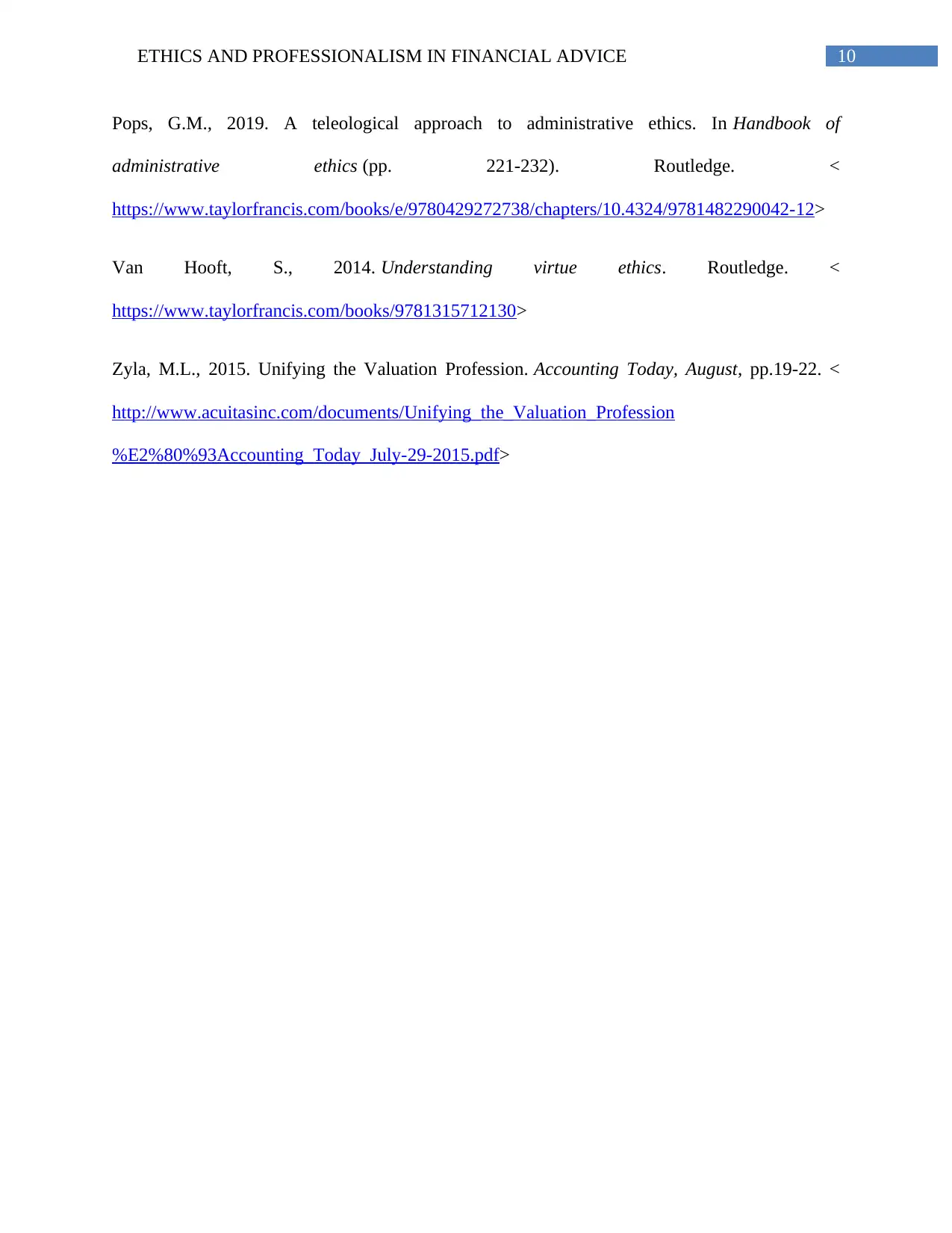
10ETHICS AND PROFESSIONALISM IN FINANCIAL ADVICE
Pops, G.M., 2019. A teleological approach to administrative ethics. In Handbook of
administrative ethics (pp. 221-232). Routledge. <
https://www.taylorfrancis.com/books/e/9780429272738/chapters/10.4324/9781482290042-12>
Van Hooft, S., 2014. Understanding virtue ethics. Routledge. <
https://www.taylorfrancis.com/books/9781315712130>
Zyla, M.L., 2015. Unifying the Valuation Profession. Accounting Today, August, pp.19-22. <
http://www.acuitasinc.com/documents/Unifying_the_Valuation_Profession
%E2%80%93Accounting_Today_July-29-2015.pdf>
Pops, G.M., 2019. A teleological approach to administrative ethics. In Handbook of
administrative ethics (pp. 221-232). Routledge. <
https://www.taylorfrancis.com/books/e/9780429272738/chapters/10.4324/9781482290042-12>
Van Hooft, S., 2014. Understanding virtue ethics. Routledge. <
https://www.taylorfrancis.com/books/9781315712130>
Zyla, M.L., 2015. Unifying the Valuation Profession. Accounting Today, August, pp.19-22. <
http://www.acuitasinc.com/documents/Unifying_the_Valuation_Profession
%E2%80%93Accounting_Today_July-29-2015.pdf>
1 out of 11
Related Documents
Your All-in-One AI-Powered Toolkit for Academic Success.
+13062052269
info@desklib.com
Available 24*7 on WhatsApp / Email
![[object Object]](/_next/static/media/star-bottom.7253800d.svg)
Unlock your academic potential
Copyright © 2020–2026 A2Z Services. All Rights Reserved. Developed and managed by ZUCOL.





